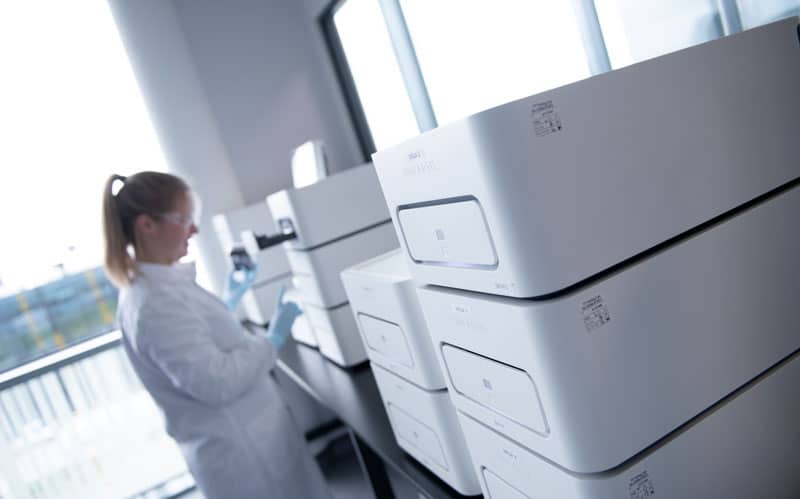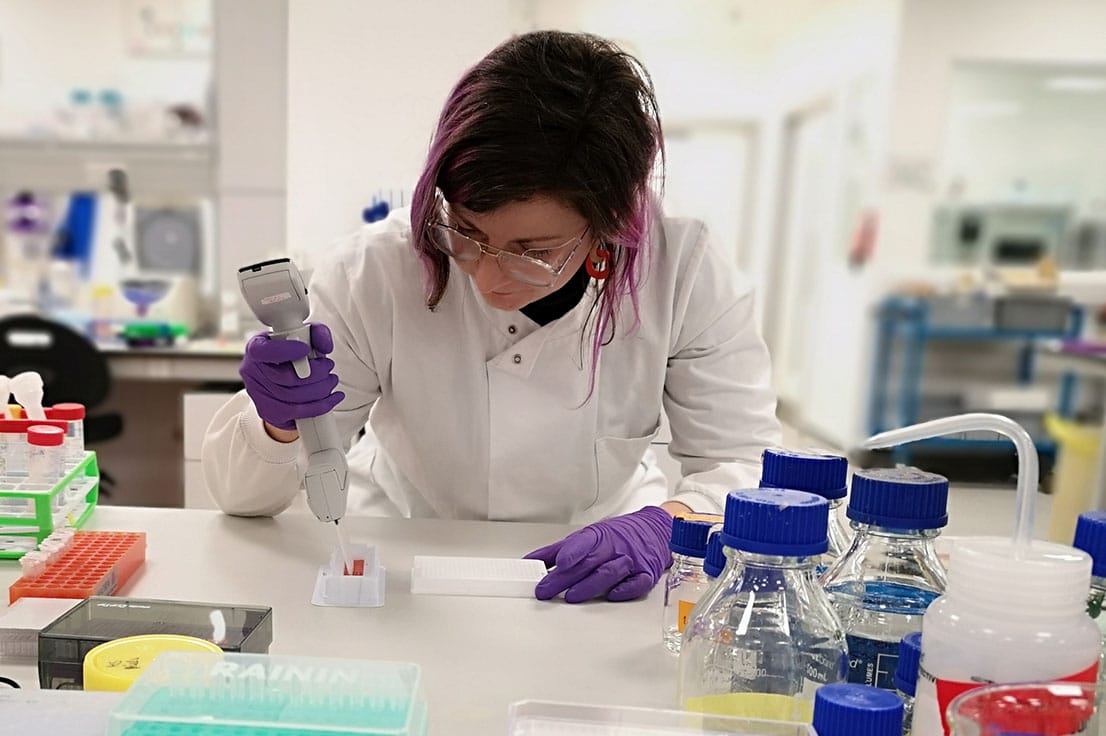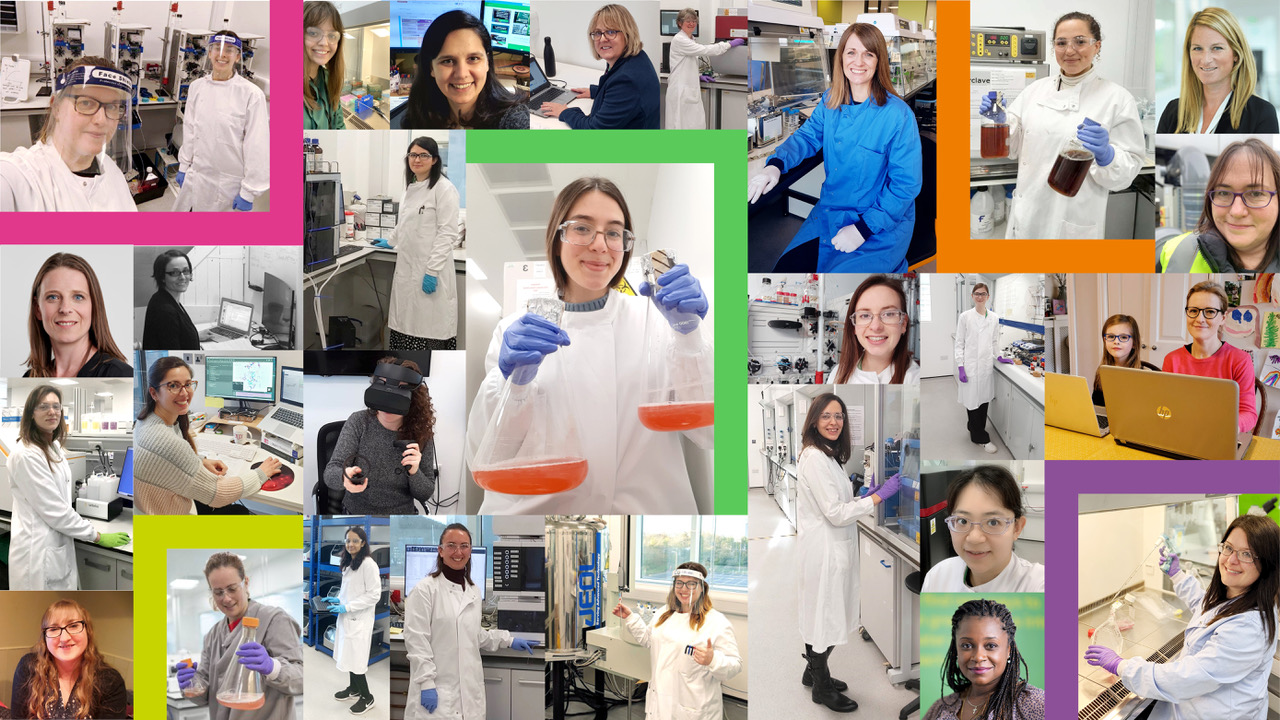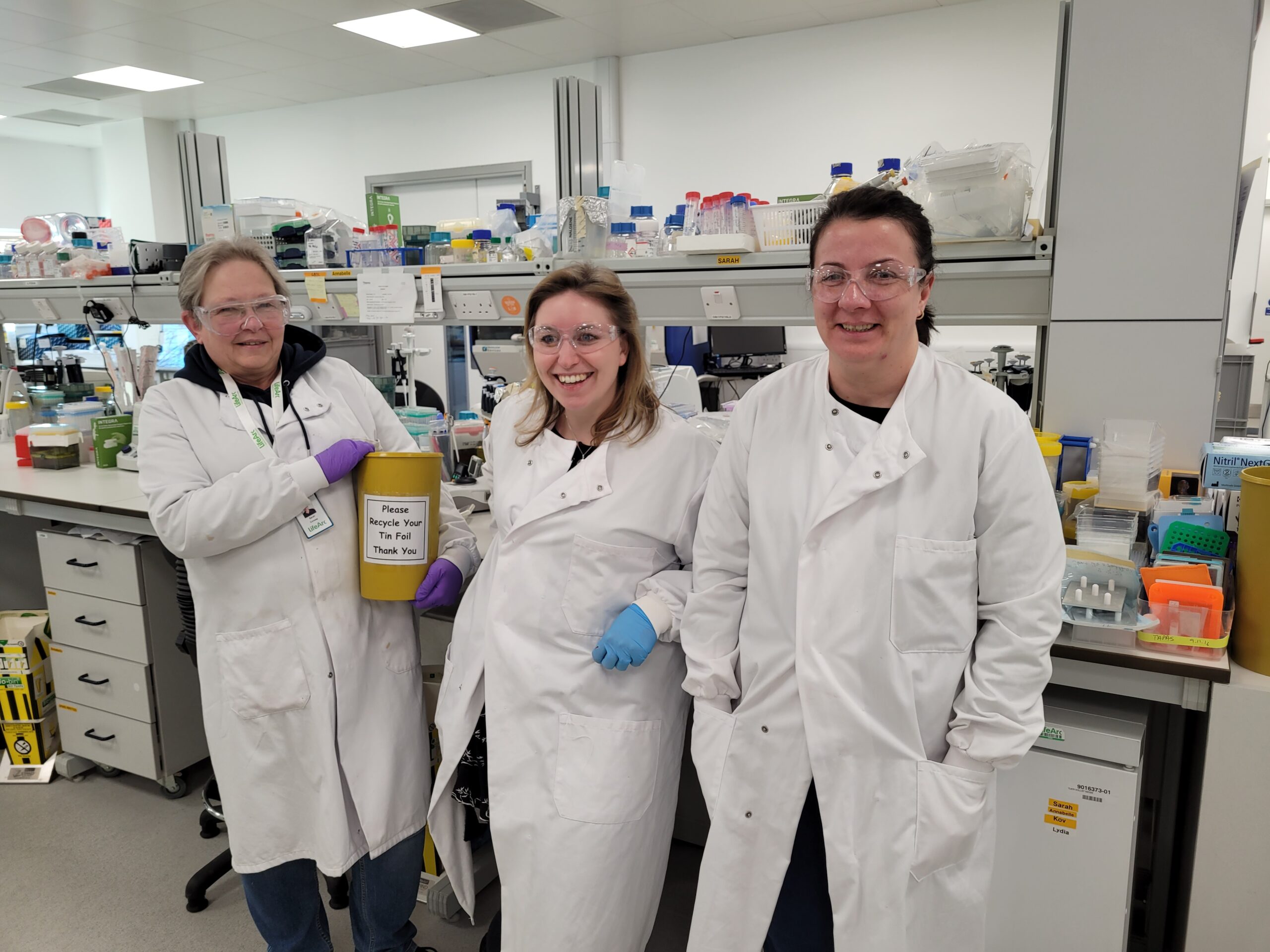February 11th marks the UN’s International Day of Women and Girls in Science – a call to action to remove any barriers that hold women back from following their curiosity about science. At LifeArc, where 50% of employees are women, we asked our CEO and seven of our scientists about their career paths and what advice they would give to inspire the next generation of girls.
Melanie Lee CBE, CEO
Melanie became CEO of LifeArc in November 2018 following a career that progressed from laboratory bench science through to business leadership. She received an undergraduate degree in Biology from the University of York and then a PhD at the National Institute for Medical Research in London. She went on to spend 30 years in industry, spanning R&D and senior leadership roles in both FTSE100s and start-ups.
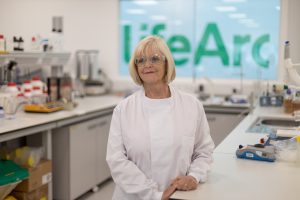 What is your job at LifeArc?
What is your job at LifeArc?
“As CEO for LifeArc, I am responsible for bringing in positive changes that enable the professional and responsible management of funds released from the monetisation of Keytruda (pembrolizumab) to really benefit the translation of academic work into new therapeutic and diagnostic products.
“LifeArc is solely based in the UK. In other roles in my life I’m on the board of Sanofi, which brings an international element to my work. Broader experience in my past, running global R&D for example, has really helped me be able to deliver business and strategic goals in a global organisation.
“It’s important for women to experience global roles as their careers mature, and these can be the most difficult to achieve. Women looking for career progression in science need to find those roles which include an international business element.”
Are there challenges for girls and women to break into science and technology?
“There’s been a generational shift as younger people reject out-dated gender stereotypes. While some corporations choose to hold onto old-fashioned beliefs, medical research is a field that simply needs the best scientists and researchers of any gender.
“It’s so encouraging to see more and more young women with mathematics and computing skills. There was a time when science was male dominated, but younger generations are growing up with technology and we will need the creativity and technical acumen of men and women for the R&D of the future.
“As the landscape changes and future jobs don’t yet exist, it’s important to acquire a basic understanding of fundamental science. That can be built upon later to include specialisations that meet the technical requirements of the future. If you have the opportunity to learn and you are interested, go for it.”
Career progression for working mothers and carers
“Developing a career in science as a female can have its challenges as we experience changes in life that may affect us – such as maternity leave, caring for children or looking after ageing relatives.
“Women who return to work after having children feel they need to continue with the same intensity of work as before. They need to be clear on what is the best part of their role and what they need to succeed, while organisations need to show skilful leadership to keep up a two-way conversation to help these women succeed in their careers.
“It’s so important to have a network of people who will support and mentor you – your family, friends, colleagues and peers to provide you with encouragement and support.”
If you are interested in science . . .
“My advice to girls in school who are interested in science is to follow your curiosity, develop good listening skills and learn how to ask the right questions. Don’t listen to voices that say it’s hard, or that it’s hard for women.”
Afrah Sattikar
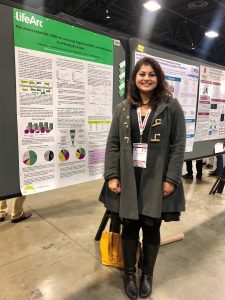
Afrah Sattikar is a scientist in the Target Delivery group within the biology department. Her role involves developing and implementing biochemical and cellular assays to support early stage drug discovery projects to assess target tractability. She is also an ambassador for STEM and represents LifeArc at industry events.
“The best part of my role is working with colleagues from other departments both within the Centre for Therapeutics Discovery and beyond. Exchanging ideas and coming up with innovative solutions, troubleshooting any issues are definite highlights. I find it highly motivating to be able to prove your theories (or disprove them!) and know you’re on the right track.
“I’ve been interested in science since as long as I can remember. The main trigger point that got me on this path was a careers talk in school which gave us a flavour of what science jobs were out there. I was excited to hear about drug discovery research and biotechnology. I also thought lab coats and safety specs were cool! It was helpful to hear about the whole research side of things and from that point on I was passionate about following a career in drug discovery.”
Fighting back against gender and racial bias
“I personally wouldn’t say I had a hard time as a woman in science. But there were times at university I felt I had to work hard to rise above gender bias and racial discrimination. Pre-set notions based on gender meant I was left out of some conversations. Women have to work twice as hard as men to achieve what they want, and science is no exception to that.
“I learned that you have to stand your ground, and that hard work does pay off ultimately! I had a good network of peers to talk to who had gone through similar experiences and this made me more determined to carry on.
“I think going forward into a career in science is a great opportunity to do meaningful work, but you have to be passionate about it and believe in what you’re doing. You don’t work in science for the money, you do it because you enjoy the work.”
“Don’t underestimate yourself, seek out mentoring opportunities and gain as much information as possible. STEM hubs are a valuable source of information and advice to explore careers in science. The dial has moved and there is greater representation now than ever before.”
At #SLAS2019 ? Come and talk to me at Poster 1354-E from 11:30-12:30 this morning and find out how the @lifearc1 Index Library is a valuable tool in phenotypic screening and for assessing target tractability. #lifearc pic.twitter.com/NC4ZcoHG1j
— Afrah Sattikar (@AfrahSattikar) February 6, 2019
Ela Smiljanic-Hurley
Ela is a medicinal chemist in LifeArc’s drug discovery team.
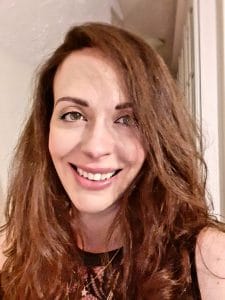 “My job is to research new treatments for various diseases. What I find most rewarding is that the research I do may one day contribute to the discovery of a new drug. I also enjoy working in the lab on a daily basis as this involves a lot of skill, such as problem solving, precision and good attention to detail. I learn new things every day and it’s never repetitive.
“My job is to research new treatments for various diseases. What I find most rewarding is that the research I do may one day contribute to the discovery of a new drug. I also enjoy working in the lab on a daily basis as this involves a lot of skill, such as problem solving, precision and good attention to detail. I learn new things every day and it’s never repetitive.
“I work on a range of really interesting and challenging projects. I have great work colleagues who are talented scientists and I really love collaborating with them. Because of LifeArc’s charitable status, we’re able to focus on some rare diseases and my research could ultimately have a positive impact on people’s lives.”
Aiming to save lives
“Ever since I remember, I wanted to do something to help people. Initially I considered a career in medicine, but I didn’t feel I would be able to deal with emotional impact of treating very sick people, especially children.
“Instead, by working in the research field, I could help develop a drug that may eventually contribute to saving thousands of lives, which would be a great achievement. I also wanted my job to be challenging – and it certainly is. The problem-solving I encounter everyday keeps me on my toes! It’s a good balance between the helping people and conducting scientific research.”
What inspired me
“At school, I was fascinated by the sciences. I especially enjoyed chemistry because it is a logical subject where you can learn the first principles that can be applied to solve more complex problems. That really appealed to me and came to me quite naturally. Biology interested me mostly from the perspective of how the human body functions. I’m always amazed by how complex the human body is – I’ll never get bored or reading and researching it. You always find out something new.”
Barriers to entry
“The pharmaceutical industry was undergoing a lot of change around the time I was finishing my studies, and many companies were shutting down. This made the job market extremely competitive. I worked hard through my masters and PhD to gain the skills and the confidence to go forward into the industry. LifeArc has changed since I started, and I’ve had the opportunity to take on challenges outside my core job.”
Work-life balance
“As a working mother, I now find myself balancing family life with my career. I chose to work part time, but I’m very organised and by having belief in myself I’ve been able to take on other opportunities at LifeArc to widen my future career options. It’s so important to identify the key areas you want to focus on.”
Advice to schoolgirls
“Gain at least a masters in the area you want to pursue and find a course that allows you to experience a lab”
“My advice to anyone thinking of following a career in science is to go ahead and do it. Believe in yourself – and most importantly, get educated. Connect with STEM events for mentoring and support. If you’re interested in science you can look forward to a challenging, interesting and very rewarding career.”
Elizabeth Love
Elizabeth is a senior scientist in drug conjugates, biologics and analysis within LifeArc’sCentre for Therapeutics Discovery in Stevenage.
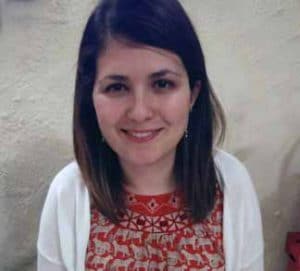 My role as a scientist
My role as a scientist
“What I most enjoy about my job is that it is never boring – I have the opportunity to learn new things all the time, and I’m always being challenged with new problems to solve. Also, I really enjoy working in teams with people from diverse scientific backgrounds, which means we are constantly learning from each other.”
Lack of careers advice
“At school, I didn’t really know how you “got into” a career in science. The only career path that was clearly laid out was medicine. I didn’t think this was right for me, but still really wanted to use science to make a difference, so I decided to do an interdisciplinary science degree and see where that took me.”
Paid lab experience during summer
“I really enjoyed my undergraduate degree and I received positive feedback on my work both on the theory side and in the lab. Because of this, I decided to contact two lecturers whose courses I really enjoyed and ask if there were any opportunities to carry out a research project over the summer. I wanted to get a bit more experience in a research lab and see if I enjoyed it. They were really helpful, and suggested I apply for a Wellcome Trust Biomedical Vacation Scholarship. This gave me the opportunity to work in labs during the summer break. It was a great experience, and set me up well for my Master’s research year. With their direction, I applied for a number of PhD programmes and that was the start of my career as a research scientist.”
Learning the fundamentals of science
“At school I was equally interested in Chemistry and Biology. I was driven by wanting to understand how medicines work and how they are developed. I wasn’t totally sure what I wanted to do as a career and didn’t feel that going straight into medicine was for me. After a bit of research, I realised I could do a degree in Natural Sciences, where I could continue to study both subjects at university.”
Biggest challenge
“I would say my biggest challenge initially was simply not knowing what career options were available to me in the science field, and the variety of paths that you can take to get there. This changed at university, as I was then taught by or went to presentations from many successful women in science, and I think that opened my eyes to the possibilities that were out there for me. ”
Jade Onakunle
Jade is a contracts adviser who negotiates the often complex agreements that facilitate our research
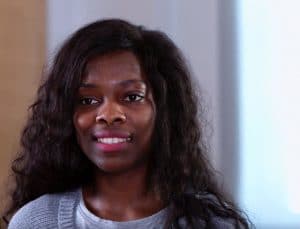 Best part of the job
Best part of the job
“One of the most rewarding aspects of my role is the expectation that the contracts I negotiate could potentially result in research that could have a huge impact to the benefit of the general public. The desire to want to make a positive difference inspired my scientific career.
“At school, I was fascinated with chemistry, in particular organic chemistry, as I found it intellectually stimulating to understand how the compounds interact with each other.”
Challenges faced in early career
“Science has so many facets to it and until you are in the industry, it is difficult to fully grasp the opportunities available. This can often make you feel as though the options are limited but this isn’t the case. Science is very broad and often interacts with so many other disciplines, as a result, there are numerous opportunities to combine science with other subjects, just like I have done.
“Furthermore, I found that it was quite difficult finding entry level roles as most positions often required some form of experience. This was frustrating as you could only get such experience once you’re in the role. But with perseverance, breaking into the industry eventually materialised.”
Seema Patel
Seema is a senior scientist in the biotherapeutics team developing antibody therapeutics.
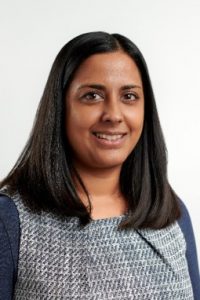 “Projects I work on range from humanising antibodies and screening panels of candidates, to selecting leads and ensuring they have drug-like properties.”
“Projects I work on range from humanising antibodies and screening panels of candidates, to selecting leads and ensuring they have drug-like properties.”
Best part of the job
“The best part of my job is analysing exciting experimental data in the lab to support a hypothesis. The nature of our work is translational – getting medicines to the clinic. Most of our projects are brought to us from promising academic research, so we try to improve this and ensure it can be a clinical candidate that can be taken into trials.”
Passion for science
“My parents inspired me to be interested in science, especially my mum. She wanted to be a doctor but was from a generation where girls were expected to get married, rather than go to university. But I guess her passion was passed onto me and my brother as we are both working in science and medicine.
“At school my main interest was in scientific subjects. I loved all the different experiments in chemistry and learning about biology— especially going on field trips!”
Challenges faced in early career
“The only barrier I came across early on in my career was that my school wasn’t great. We had a lot of supply teachers and hardly any of my female friends chose science or maths. I was the only girl doing maths A-level at my school and one of four doing biology and chemistry. I needed a lot of passion for the subjects to keep motivated, but I just couldn’t see myself doing anything else.”
Advice for girls entering science
“Experience in the lab is something that can set you apart from other candidates for a job.”
“If you’re passionate about science, then do it – it’s one of the most rewarding careers you can have. Studying science gives you a lot of transferable skills so you will have many career options. You need keep yourself motivated as it can be a hard slog studying from BSc to PhD. Look for a degree that offers lab work, or one with an industry placement. I was fortunate that my degree involved a lot of lab-based work, which gave me valuable practical experience.”
Tanja Taylor
Tanja is an analyst within the Opportunity Assessment Group
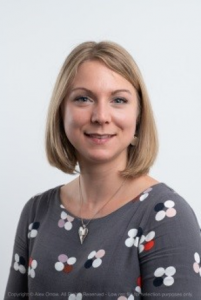 Best part of the job
Best part of the job
“The most enjoyable part of my job is the variety of interesting and potentially ground-breaking research we are exposed to which means that I learn something new every day. LifeArc is a great place to work with a friendly culture and helpful colleagues.”
What inspired me
“I have always been interested in understanding the world around and within me, what are the mechanisms underlying how the human body works, what causes disease and how can we fix it? I liked the idea to be able to push the boundaries of our understanding. I have always had a desire to make an impact on human health.
“Biology was always my favourite science subject, particularly when it came to learn about basic genetics and neuroscience. It amazed me to think that our building plan was encoded in these four bases present in every cell and that minuscule differences in this code could lead to such huge variability between different species or even individuals within the same species.
“Neuroscience fascinated me – the notion that all your thoughts and feelings – essentially, what you perceive as yourself, is based on electrochemical signals in your brain. I find it very exciting to think that if you understood these underlying mechanisms you could then use that knowledge to “fix errors” in the system and cure disease.”
Early challenges
“I thought my interest in science would best be served by pursuing an academic career, however, I realised during my PhD that this was not for me. I had a very romanticised view of doing some fun experiments and making amazing discoveries that change people’s lives.
“This, however, was too narrow in scope, I felt a lot of frustration with failed or inconclusive experiments, the great insights I was hoping for were lacking and I felt I was too far removed from any benefit to humans. It took some time to realise and discover that there are other scientific professions out there that were more suited to my interests and strengths.”
Zhi Yao
Zhi is a senior scientist in the target validation group at LifeArc
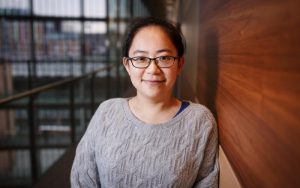 “My day-to-day job is growing cells in the lab and testing new compounds to understand whether a target is suitable for eventually becoming a treatment. I work mostly on oncology projects and as my interest is in neuroscience, I’m part of the neuroscience disease leadership group. I also a volunteer with the St Johns Ambulance in my spare time.
“My day-to-day job is growing cells in the lab and testing new compounds to understand whether a target is suitable for eventually becoming a treatment. I work mostly on oncology projects and as my interest is in neuroscience, I’m part of the neuroscience disease leadership group. I also a volunteer with the St Johns Ambulance in my spare time.
“The best part of my job is collaborating with all sorts of scientists from different disciplines, as well as with external partners and peers from pharmaceutical companies, charities and academia.”
Feeling wee bit sentimental as I’m harvesting/killing the beautiful #iPSC derived neurons which I have been carefully culturing in the lab since last decade (ok, Dec 2019 count as last decade 😂). Thanks for help us understanding pain little cells! #FridayCellfie #stemcells pic.twitter.com/iWMJKeZBGY
— Zhi Yao (@zyao2010) February 7, 2020
Genetic disposition for science
“I was inspired to follow a path to science by my parents who are both scientists. I spent a lot of my childhood in in their labs, so I wanted to become a scientist from an early age – it must be in my genes! Ironically, neither of my parents particularly encouraged me to get into science. At that time in China, there was a tendency to consider science as too hard for girls and I would be much happier studying an easier subject. But I found everything about science fascinating – physics for the equations and mechanisms of how things work, biology to find out about plants and animals and chemistry to make liquids change colour in experiments.”
Lack of role models
“One of the challenges for me at the time was the lack of female role models in science. At LifeArc, it’s amazing how many women are in senior leadership roles. At University, I had a lot of female peers, but few leadership positions were held by women and hardly any minority groups were represented at that level.
“It takes a lot of confidence to attain leadership positions and as women we perhaps lack the confidence of our male peers. To build a career as a woman, we need to feel confident in our abilities and work hard to acquire those abilities.”
Interested in science?
“I would say to schoolgirls who want to get into science: Just do it! And don’t let anyone stop you. Science is really fun!”

